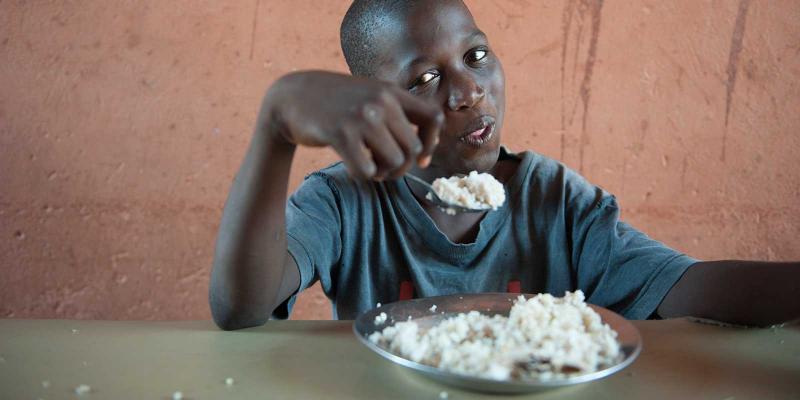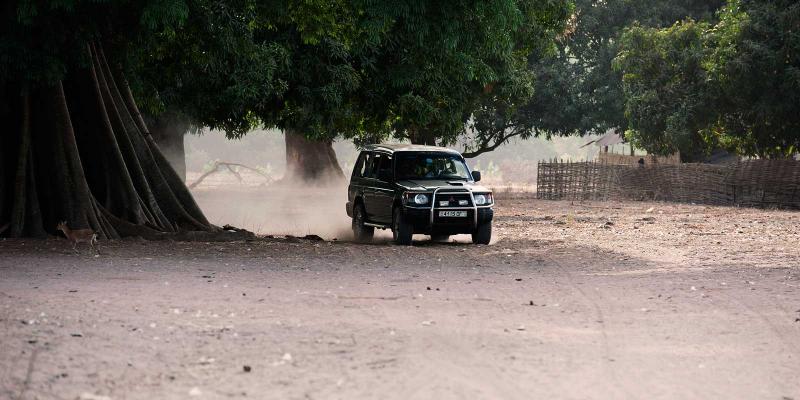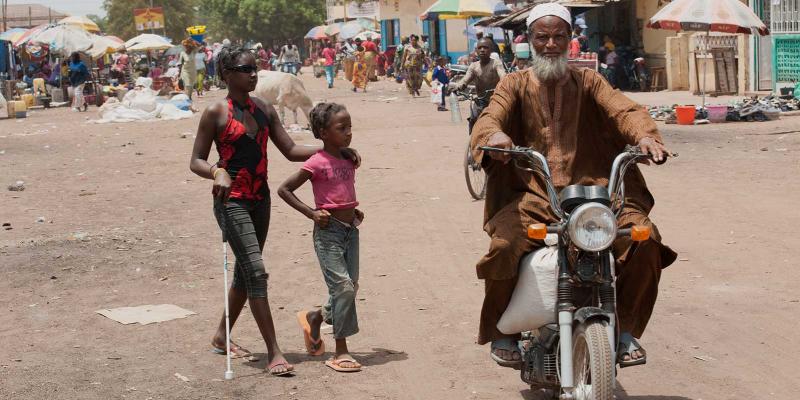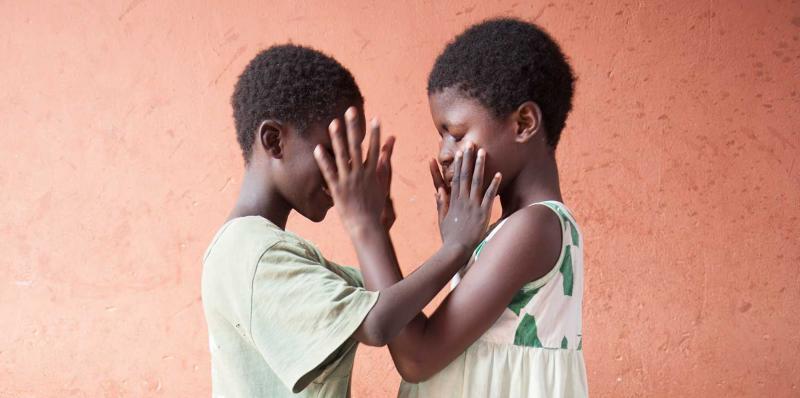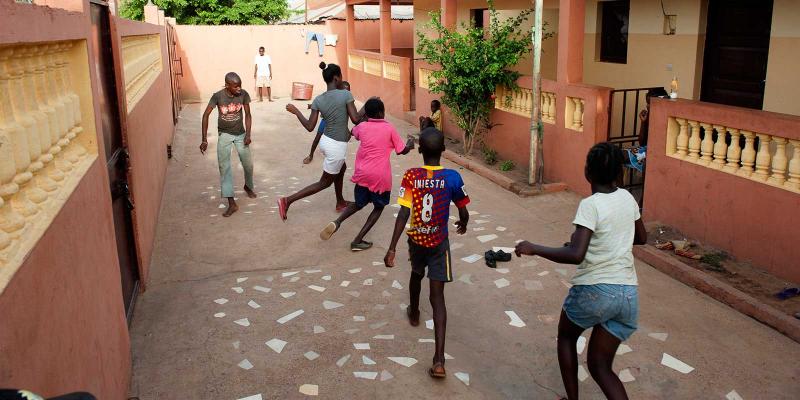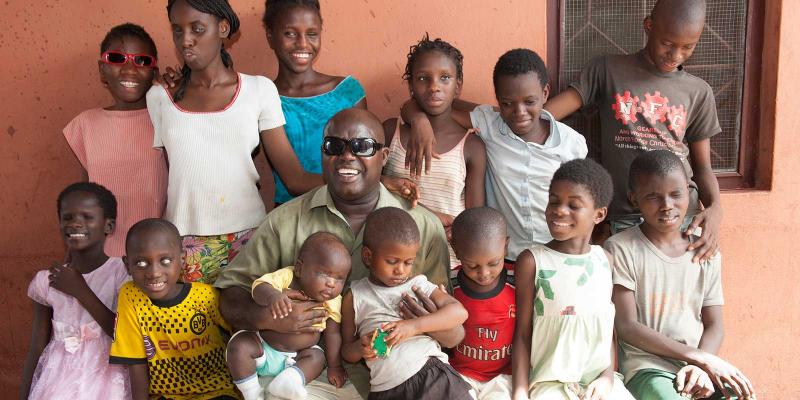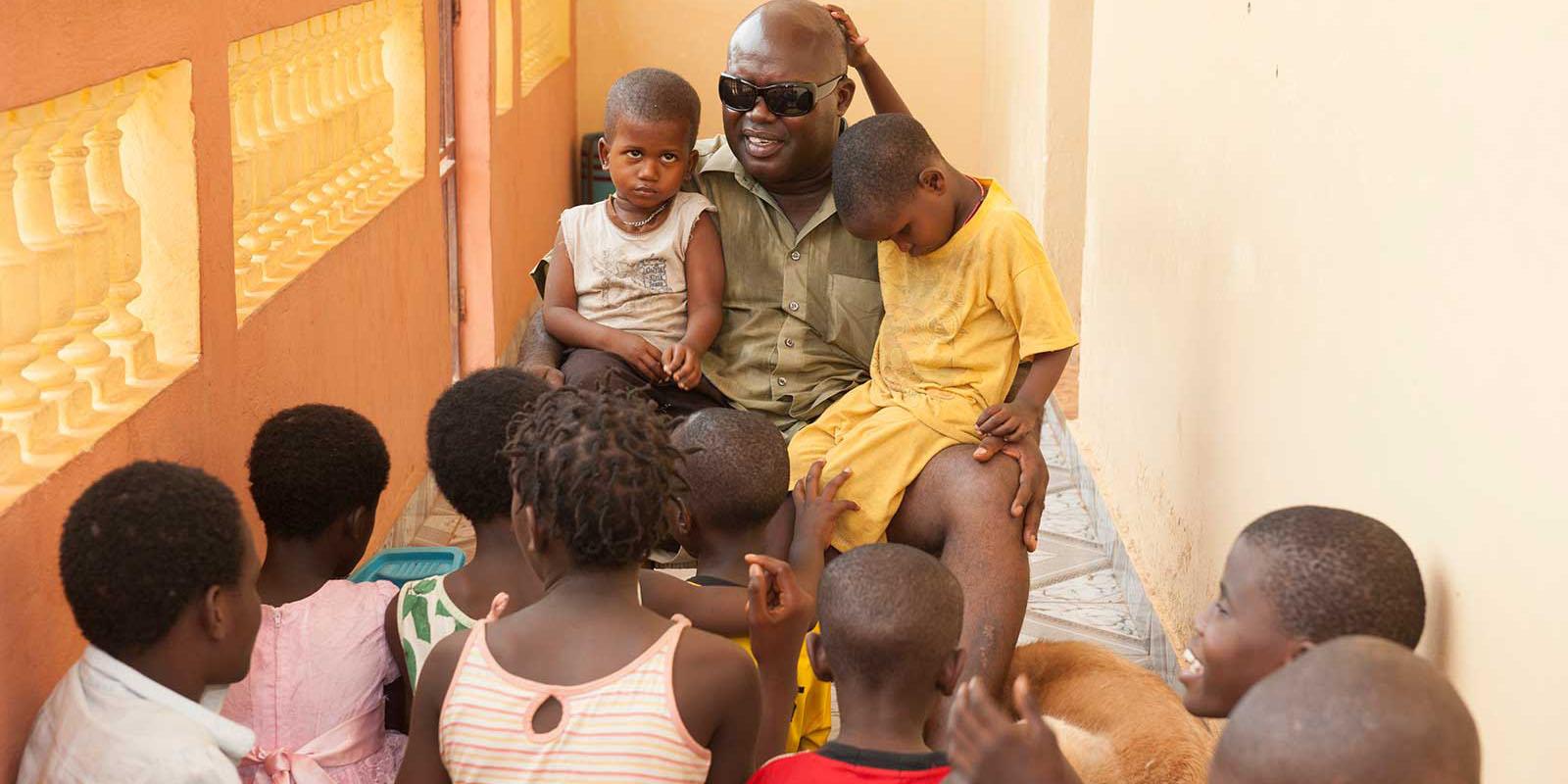
Manuel strokes the girl’s head gently. Adelia, 9, leans against him on the bench where they are sitting. When she was a newborn baby, she was left to die in the forest because she is blind.
“That makes me sad and angry. Unfortunately, Adelia is not an exception. The situation in Guinea-Bissau for children who are blind or have other disabilities is terrible. Many people see these children as worthless, so they don’t give them love or let them go to school. My life is all about fighting for these children,” says Manuel.
Manuel knows how much a child with different abilities needs care and love from the adults in their life, and not to be let down and abandoned. He knows this because he himself lost his sight at the age of three.
“I grew up in an ordinary family with lots of children. There were nine of us, and my mother Anna-Maria and my father Luis loved us all. My dad and I were best friends. We walked hand in hand to preschool every day, and we played together a lot. We went swimming and played ball sports. Even though I was little, we usually wore matching clothes. I remember my father was always happy.”
When Manuel was three, something happened that changed everything.
“My eyes, which had been brown, started to turn blue, and everything started to look blurred. I found it harder and harder to play and get around, and I had to stop going to preschool because I couldn’t see well enough. This made me really sad. But my father was even sadder. He cried almost all the time.”
The long journey
Manuel’s father refused to accept that his son had become blind. He decided to make sure Manuel received the best medical care he could find. But that was not in Guinea-Bissau, but in Portugal, where his brother lived. He started to contact people who might be able to help. And he started saving as much money as he could from his army pay check. There was less food on the table for the whole family. But they persevered, and finally managed to get a flight ticket to get Manuel to his uncle in Portugal. But nobody else in the family could afford to go with him.
“It wasn’t easy for me. I was only four, and I was sad and afraid. But I was lucky. There was a nun on the flight who helped me, and at the hospital there were nurses called Judite and Lurdes who cared for me. They comforted me, read books and sang songs, just as my parents would have done.”
Manuel had high hopes that the doctors in Europe would be able to help him get his sight back.
“But after a year in hospital, they told me that there was nothing they could do to fix my visual impairment, which is called glaucoma. The medical treatment had come too late.”
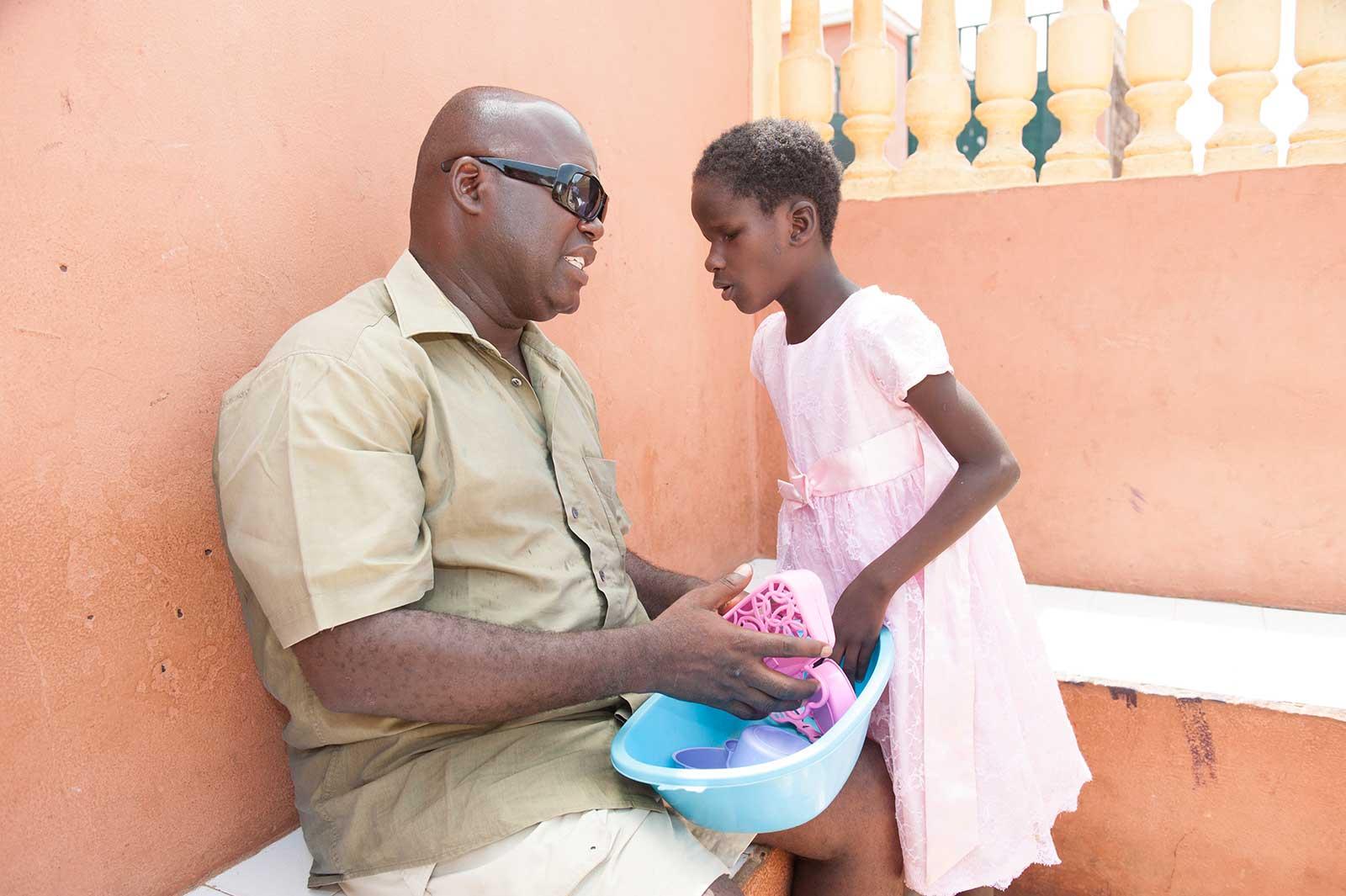
Manuel with Adelia, who was left in the forrest to die as a baby, but was rescued by shepherds. Since then, Manuel and his wife have taken care of Adelia and given her a home, love, and an education.
School for the blind
Once again, it was Manuel’s father who was the most upset. But he kept fighting for his son. He had found out that there were good schools for blind children in Portugal, but that they were expensive. There was not a single school for blind children in Guinea-Bissau, so once again Manuel’s father began saving money to help him.
“The family managed to raise enough for me to go to a boarding school in Portugal. Although I missed my family, I was really happy there. I learned to count, read and write, using braille. At school I also learned practical skills, like getting dressed, washing and brushing my teeth. And I made lots of new friends. My best friend was called António and in our free time we played football and went swimming.”
Heartbreak
The years passed, and Manuel learned how to live as a blind person. Maybe life was going to be fine after all. But one day, after six years at the school, Manuel received another life-changing message. His father that died suddenly from a heart attack.
“I was ten years old and I lost both my father, and the chance to continue with my education, since nobody else was able to pay my school fees. I took the boat home to Africa and I was devastated the whole way.”
When Manuel arrived the country was at war. Guinea-Bissau was fighting to be liberated from colonial power Portugal, which had been in charge. The family took Manuel to safety with relatives in neighbouring Guinea. There, he was able to attend a school for children and young people with different abilities. Six years later, Guinea-Bissau became independent and Manuel returned home.
Stopped the president
Guinea-Bissau was poor and ravaged by war. Manuel’s family had to survive on whatever his mother managed to sell at the market. Manuel, who was sixteen, realised that he needed to get a job and help out. Nobody believed that a blind person could get a job, but Manuel walked to the presidential palace every day and asked to speak to the president. He believed that the president would help him and other people with different abilities to find work. Every day, he was told it was not possible to meet the president. But he kept going.
“One day I managed to stand in the way of the president’s car so he had to stop! The president’s guards took me to him. I explained that I needed help to get a job, since nobody employed blind people. I said that I had learned to work as a switchboard operator at school in Guinea. The president was curious, and he let me try out the switchboard in the presidential office. When I passed the test he was so impressed that he arranged a job for me at the head office of the postal service!”
Became a businessman
A year later, the president was deposed in a coup, a new telephone system was installed and Manuel lost his job. But he didn’t give up. He had managed to save some money and he decided to become a businessman instead. Manuel bought school resources, toiletries and drinks in the city, which he then sold in rural areas. He used the money to buy palm oil and timber, which he then sold in the city.
“It was tough work, but I liked it. After a while it was going so well that I was able to buy an old car, employ a driver and start a taxi company too. Finally, I had managed to save so much money that I was able to build a beautiful house for my family. It felt fantastic to give that to my mother, after everything she had done for me.”
Starting AGRICE
Although Manuel was doing well, he didn’t forget the blind children in the country who had not had the same opportunities that he had had. Who didn’t have parents who loved them. And who hadn’t been able to go to school because their parents thought it was a waste of money, since blind people couldn’t work anyway, or even help out at home.
“Many were kept hidden, or abandoned. Some people even thought that blind children were possessed by evil spirits, and they were left in the jungle to die. And still, the government hadn’t provided a single school that was adapted for blind students, in the whole country,” says Manuel.
So in 1996 Manuel started an organisation called AGRICE (Associação Guineense de Reabilitação e Integração de Cegos / The Guinean Association for Rehabilitation and Integration of the Blind), so that blind people could raise awareness in their society and fight for respect for their rights together.
“I wanted to show everyone that we are here, and that we have the same rights as everyone else. The right to go to school, get a job, and participate. And by being together, to make sure we wouldn’t feel alone any more.”
Safe home
Through AGRICE, Manuel came into contact with many blind children whose lives were difficult. When his mother died, he decided to convert half of his house into the first safe home for blind children in Guinea-Bissau. The first people who moved in in the year 2000 were brothers Suncar, 11 months, and Mamadi, 6. “After their father abandoned the family, the mother was accused of being unclean, because she had given birth to blind children. She was thrown out of the village,” says Manuel. With his wife Domingas, Manuel took care of the two little boys. They gave them food, clothes, medical care and security. Rumours of how well the brothers were treated at Manuel’s home spread, and more and more blind children started to come. “At the same time we started our rescue missions, where we visited rural villages to look for blind children or children with other disabilities, who we knew often lived in mortal danger. We told people about the rights of the child and offered to take care of children who needed help. Soon we had over forty visually impaired children living with us!” Manuel paid for everything for the children out of his own pocket, and it was hard to make ends meet.White cane school At Manuel’s place, the children learned how to take care of themselves and help their families when they returned home, because Manuel’s goal was for the children to return home and participate in society. They learned to wash clothes and dishes, tidy up, get dressed, cook simple meals and much more. But Manuel knew that the children needed to go to school too, just like all other children. He campaigned tirelessly for the government to start a school adapted to the needs of blind children, with teachers trained in braille. He wrote letters, phoned and visited the authorities for several years. Nothing happened. “Finally, they got tired of me. The government didn’t plan to start a school, but they gave me a bit of land to build on, to shut me up I think.” Manuel and AGRICE had hardly any money, but they built a small, simple school from bamboo and palm leaves, where to begin with the children sat on the ground with no desks. At the same time, they trained teachers in braille. The school was finished in 2003 and was called ‘The White Cane’ (Bengala Branca), after the canes that blind people often use. “One day the Canadian ambassador visited the school to see how we worked with our students. As we stood there in the classroom, a huge snake came slithering through the grass towards the children. The ambassador got a fright, and was concerned for the children’s safety. After the meeting with the snake, the embassy decided to give us money to build a safer school for the children!”
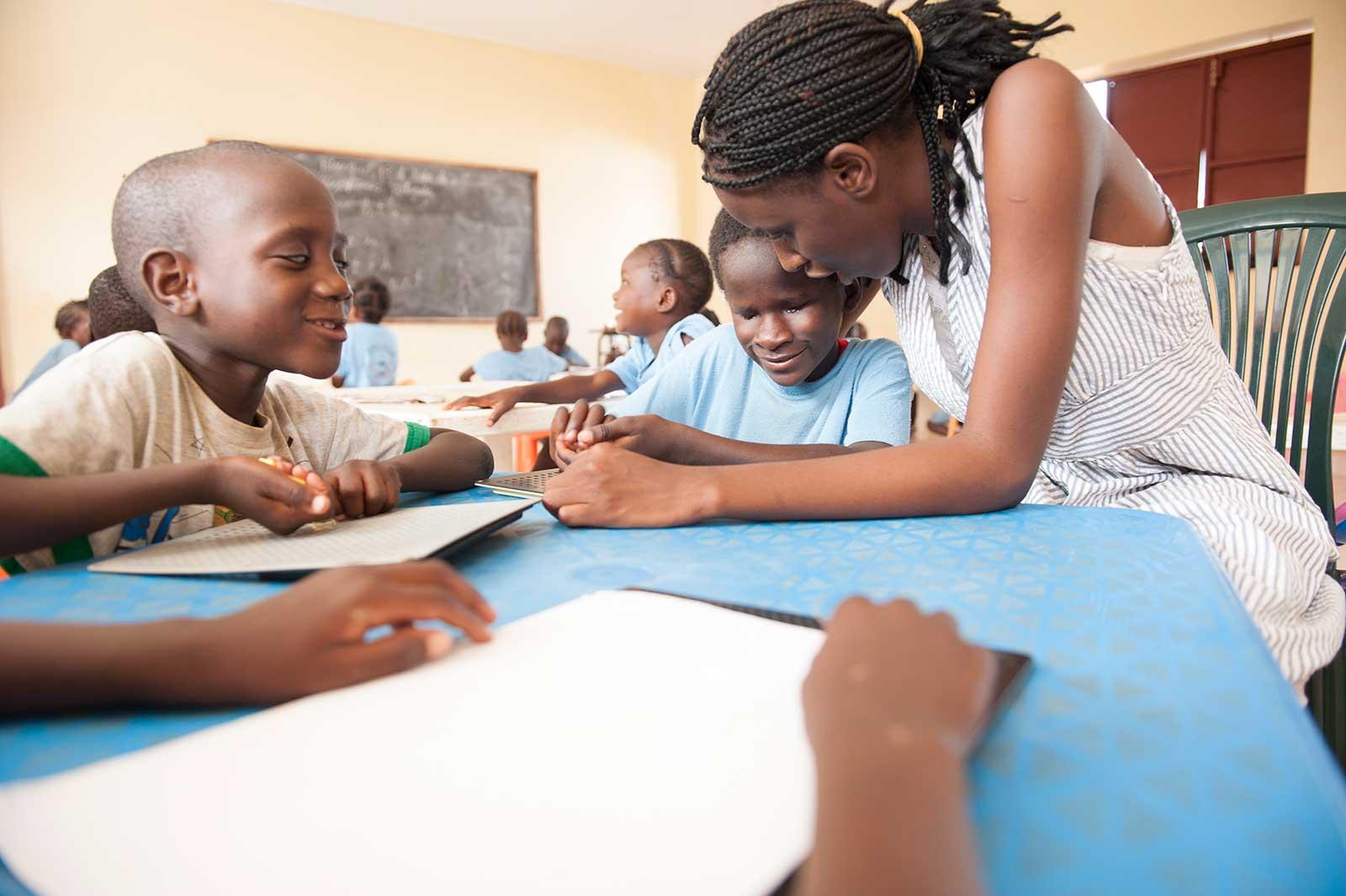
Both blind and sighted children attend Manuel’s ‘White Cane’ school and they play together at break times.
Mixed school These days, no students sit on the floor in Manuel’s school. With support from Portugal and Canada, AGRICE has built a school with six classrooms, a dining hall, a library, a music room and two craft workshops. The Department of Education in Guinea-Bissau provides teachers for Manuel. And now the school is open to all, not just students with a visual impairment. Right now there are 70 students with a visual impairment attending the school, and 177 who can see. “It’s clear to me that we should all learn together. It’s a good way to prevent isolation of children with disabilities, and to help people understand that all of us have a part to play in society. We are all of equal value. To begin with, there were lots of families with sighted children who thought it was strange to send their children to our school, but now we have a reputation as one of the best schools in the country and lots of people want to come,” says Manuel.
Manuel’s 250 children 16 years have passed since Manuel took in Suncar and Mamadi, the abandoned brothers. Since then, he has helped over 250 blind children in the same way. Today, 41 people work at AGRICE, and they give blind children a home, food, medical care, the chance to go to school, security and love. The children don’t need to pay anything. Most are reunited with their families once Manuel has fully prepared their villages by telling them the best ways to care for visually impaired children. The children come from poor families and continue to receive support from AGRICE after moving home so that they can continue their education and have a good future. Today there are 37 children living at Manuel’s home, but soon there will be more, because he and AGRICE will continue their rescue missions to distant villages. “Even though the situation for children with different abilities has become much better since we began our work, there is still much to do. We are a poor country where many people can’t read because they have never been to school. That’s why we need to keep spreading the word about the rights of all children out in the villages. Just a few years ago, Adelia was left to die because she was blind, and similar things still happen. That’s why it’s of vital importance that we are there!”
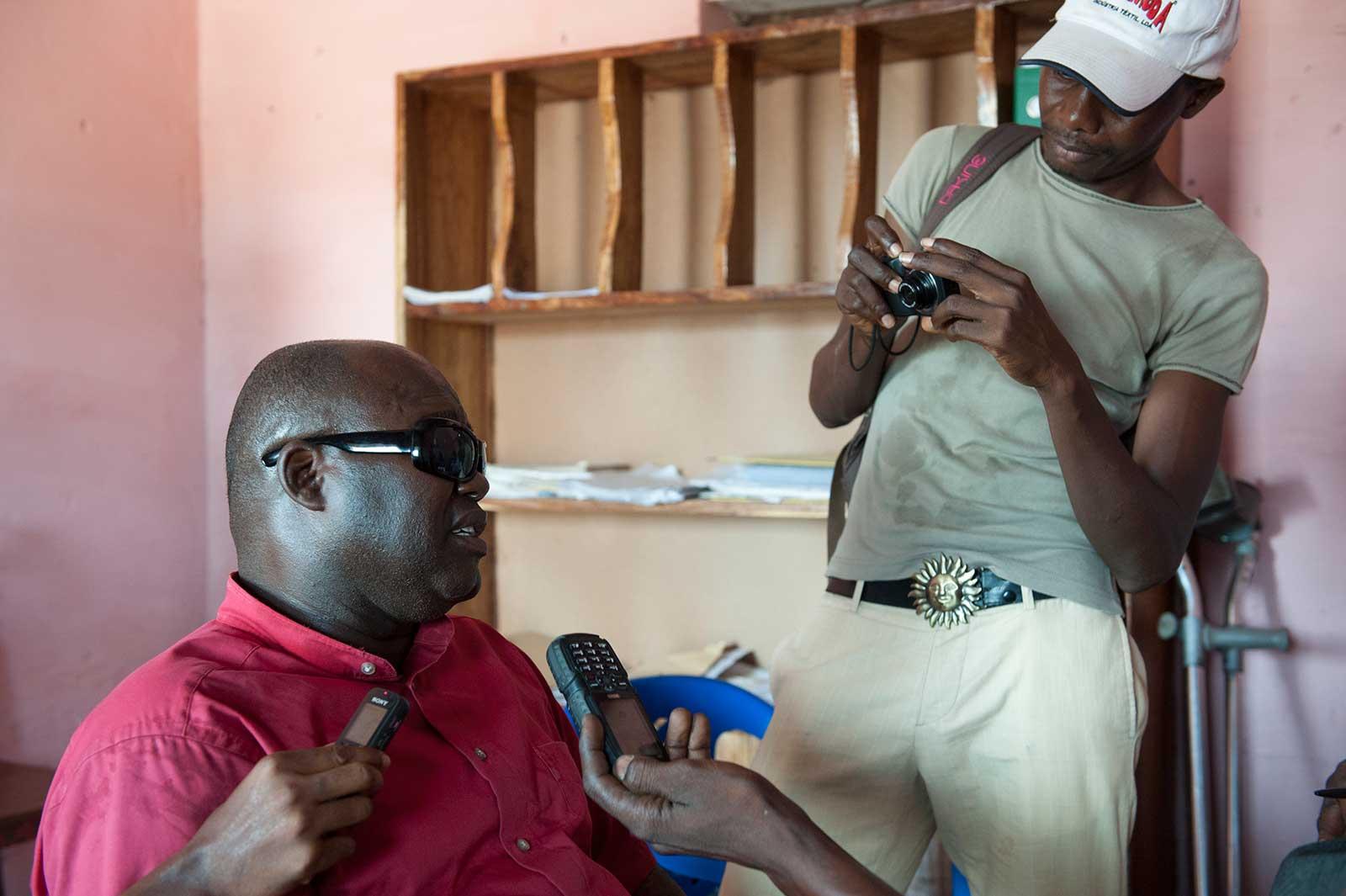
Manuel talks as often as possible to journalists, on the radio and to politicians, on how children with disabilities have the same rights as all other children.
“Our goal is that all children, even children who are blind or have another disability, should have chances in life and hope for the future. All children should feel that they matter and they belong in society".
Like father like son Sometimes Manuel feels exhausted and sad about all the terrible things that happen to children in Guinea-Bissau. But instead of giving up, he becomes even more determined to continue his work. “At those times I think about all the chances I got in life thanks to my father. He was my best friend, and his love for me made him strive to get me the best medical care and education possible. My father is my role model. The way he treated me is the way I want to treat all the visually impaired children who need me. Like Adelia, for example. I’ll keep on fighting for her rights and the rights of all other blind children for as long as I live.”
Related stories
Långgatan 13, 647 30, Mariefred, Sweden
Phone: +46-159-129 00 • info@worldschildrensprize.org
© 2020 World’s Children’s Prize Foundation. All rights reserved. WORLD'S CHILDREN'S PRIZE®, the Foundation's logo, WORLD'S CHILDREN'S PRIZE FOR THE RIGHTS OF THE CHILD®, WORLD'S CHILDREN'S PARLIAMENT®, WORLD'S CHILDREN'S OMBUDSMAN®, WORLD'S CHILDREN'S PRESS CONFERENCE® and YOU ME EQUAL RIGHTS are service marks of the Foundation.



